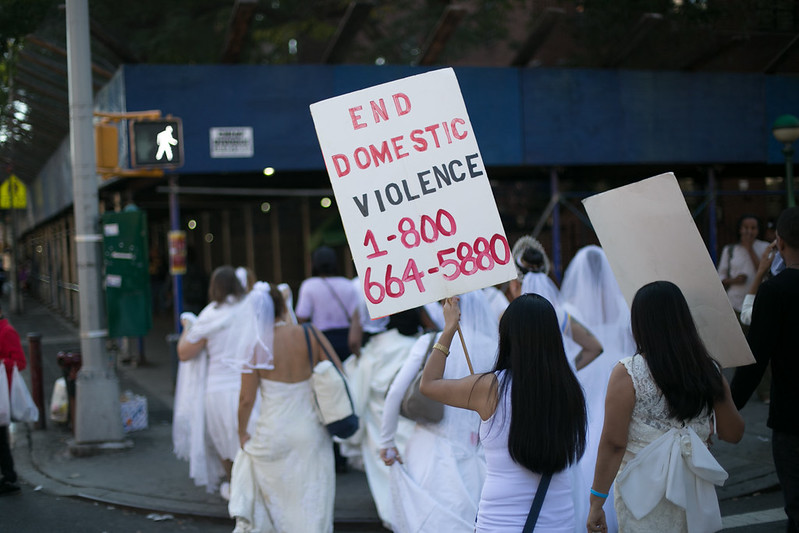
A march against domestic violence (photo: William Alatriste/New York City Council)
Though Domestic Violence Awareness Month has ended, domestic violence is a tragedy that occurs every month, and every day. Uplifting the voices of survivors, recognizing the harm of abuse, and pursuing evidence-based solutions to break cycles of violence must be year-round priorities.
And sometimes, that evidence points in unconventional directions.
Our primary duty is to support survivors of domestic violence. The best way is with comprehensive, intersectional, and culturally-responsive crime victim services that help survivors escape future violence. This means providing safe and stable housing; emergency financial support on everything from food to clothing; and criminal legal system advocacy and guidance. Without these vital supports, we won’t solve this crisis.
Another strategy is to provide trauma-informed support to partners who commit abuse. This may seem like an unorthodox, even controversial, approach. But domestic violence is a unique offense. It involves people in deep, personal relationships with intense emotional connections.
Those who commit domestic violence reoffend at higher rates than virtually every other crime category. One study showed that anywhere from 20% to 33% of violators reoffend within months; another puts the frequency of recidivism in domestic abuse cases at more than 60% within months of a previous incident. And there are troubling signs that the pandemic has worsened domestic violence.
New approaches are urgently needed to break the cycle and actually curb the violent, destructive effects on survivors and families. That means using every strategy available.
Abusive partner intervention programs (APIPs) can reduce crime and provide long-term benefits to both parties involved in an abusive relationship and to the community as a whole – if done the right way. It’s not easy. Abusive partner interventions are challenging. But instead of giving up on these efforts to prevent recidivism, we must reinvigorate our commitment to proven methods that get results.
That means understanding that changing a person’s abusive behavior won’t take place if they are in a traumatized state. We must acknowledge and treat the trauma that so often triggers - and retriggers - violent acts.
This is what trauma-informed, culturally-responsive abusive partner interventions offer, which is dramatically more intensive than traditional APIP programs. The difference is that programs dig deep into both accountability and addressing root causes of behavior.
Importantly, this approach elevates survivor safety first and foremost and emphasizes abuser accountability. Clear protocols for compliance, strict schedules and guidelines, and crystal-clear coordination of services and support drive every part of this strategy. Centering survivors' voices and views in all aspects is a sacrosanct principle.
But understanding how past traumatic experiences can cause present and future behavior provides an invaluable way to prevent harm and violence. Tailored supports can help a person who commits intimate partner violence address and salve their trauma, and engage in the challenging work towards behavior change. Matching resources and designing programs to meet these needs is an innovative way to both identify and address the root causes of abusive behavior.
Providing services to those who cause harm does not excuse their crimes, or shift the burden of their offenses away from them. Abusers are responsible for their actions, and must be held accountable. Part of that accountability should include working to achieve real behavioral changes, which can only happen with trauma-informed engagement. In fact, many survivors want to see their partners receive this support, so cycles of violence can end and healthy relationships can begin.
When done the right way, trauma-informed interventions can help abusive partners develop care and compassion for survivors, do the work required to change their actions, and ultimately accept responsibility for the harm they’ve caused. This accountability is how we break cycles of violence.
We should invest in trauma-informed abusive partner interventions this month and every month, so that when Domestic Violence Awareness Month comes around next October, we can celebrate new, real reductions in this awful scourge.
***
Alison Diéguez is a Program Director at the CUNY Institute for State & Local Governance (ISLG), where she oversees ISLG’s work on gender-based violence and trauma. Nathaniel Tolbert, LCSW, is the Clinical Director of Manhattan APIP’s Urban Resource Institute and Director of URI’s Trauma Informed Abusive Partner Intervention Program and The Mayor’s Office to End Domestic and Gender Based Violence supported Respect and Responsibility Program. On Twitter @URI_NYC & @CUNYISLG.
***
Have an op-ed idea or submission for Gotham Gazette? Email This email address is being protected from spambots. You need JavaScript enabled to view it.




